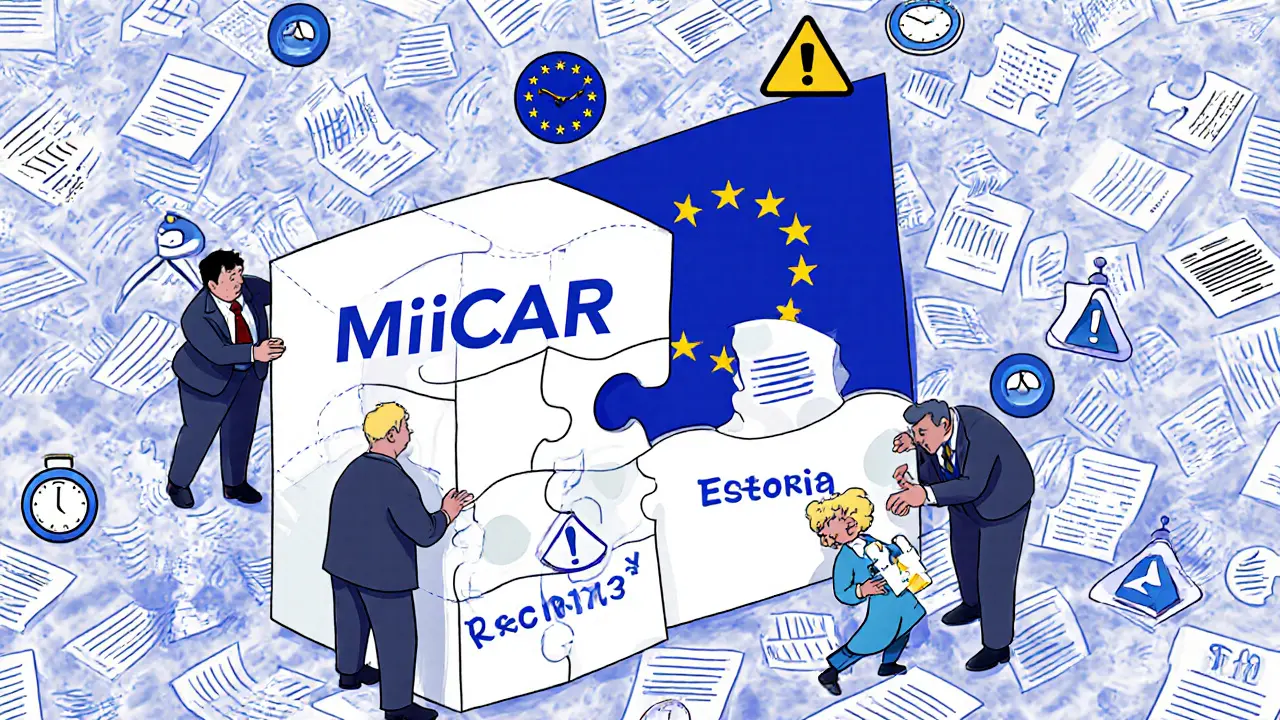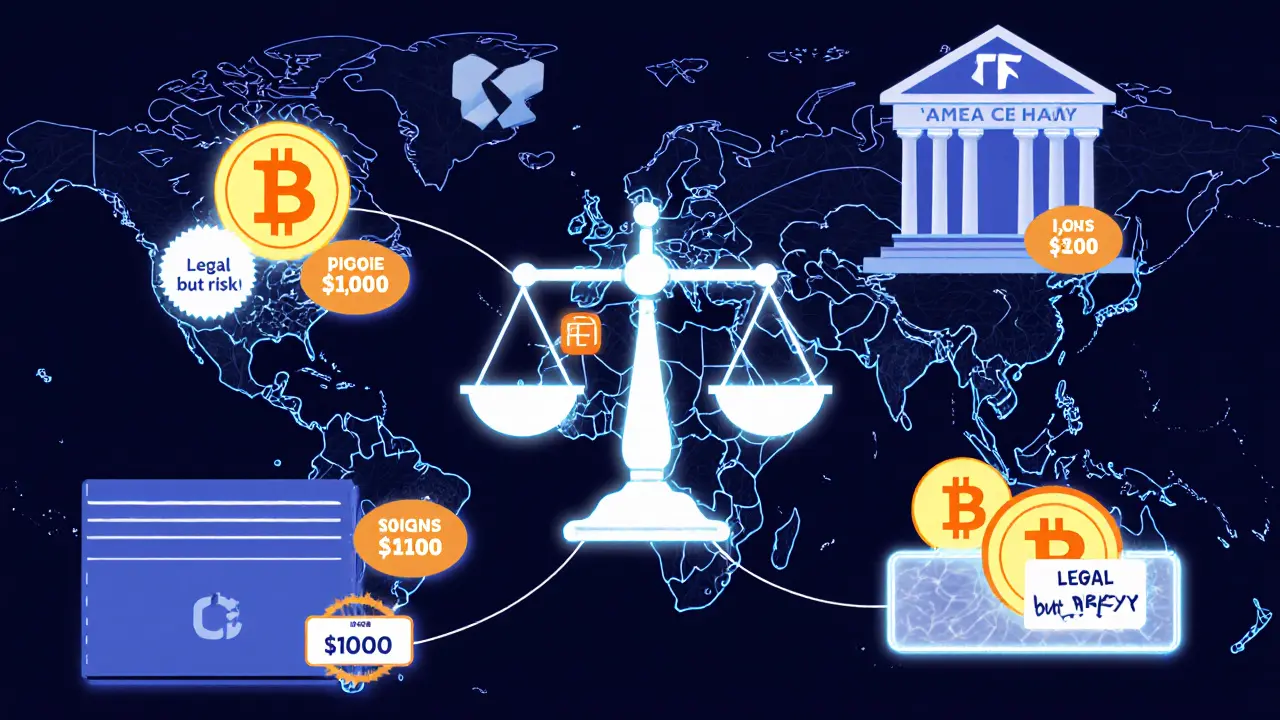Keeping up with crypto regulations isn’t just for lawyers or compliance officers anymore. If you’re holding Bitcoin, trading altcoins, or running a crypto business, you’re already affected by the rules - whether you know it or not. In 2025, the global landscape has shifted faster than ever. What was legal last year might now trigger fines, freezes, or even criminal charges. And the opposite is true too - some places have opened doors that were slammed shut just months ago.
What’s Actually Changing in 2025?
The biggest shift happened in the United States. After years of enforcement-heavy tactics - where agencies like the SEC sued first and asked questions later - the Trump administration dropped a hard reset in January 2025. An executive order created a task force with one mission: bring clarity. By February, the SEC closed investigations into OpenSea and Robinhood without penalties. Coinbase’s legal battles were dismissed. And the most surprising move? Memecoins were officially removed from the SEC’s securities list. That doesn’t mean they’re unregulated, but they’re no longer automatically treated like stocks. That doesn’t mean everything is free for all. OKX still pleaded guilty in February 2025 for operating without a money transmitter license and paid millions in fines. The message? Don’t break the rules - but now you know what the rules are before you get punished.The U.S. Is Building New Rules - Slowly
Two major bills are moving through Congress in 2025. The Stablecoin Trust Act would force stablecoin issuers like USDT and USDC to prove they hold enough cash or short-term Treasuries to back every coin. They’d need segregated reserves, quarterly audits, and oversight from both the Federal Reserve and the OCC. No more shady reserves. No more “we’re 100% backed” claims without proof. Then there’s the FIT Act. This one tries to end the SEC vs. CFTC turf war. Under this law, tokens would be classified as either securities (if they’re investment contracts) or commodities (if they’re more like digital gold). The SEC would handle the first, the CFTC the second. No more confusion. No more lawsuits over whether a token is a security. If you’re building a DeFi protocol or launching a new token, this could be the first time you get a clear answer before you code. But here’s the catch: federal law still doesn’t override state laws. You still need a money transmitter license in 47 states. Some states like Wyoming are crypto-friendly. Others like New York still require a BitLicense, which can cost over $50,000 just to apply. So even with federal clarity, you’re still juggling 50 different rulebooks.Europe: MiCAR Is Live - But It’s Complicated
The EU’s Markets in Crypto-Assets Regulation (MiCAR) became fully active in 2025. It’s the most comprehensive crypto law ever passed by a single bloc. Every exchange, wallet provider, and token issuer operating in the EU now needs a license. They must publish white papers, disclose risks, protect user funds, and prove they have enough capital to survive a market crash. But MiCAR isn’t simple. Requirements rolled out in phases. Some rules started in January. Others didn’t kick in until July. If you’re a small startup in Estonia trying to serve customers in Germany and France, you’re dealing with overlapping deadlines, language requirements, and local regulators who interpret the rules differently. The EU didn’t just create rules - it created a compliance maze. Still, it’s better than before. Before MiCAR, you could set up a crypto exchange in Malta and sell to someone in Belgium without anyone checking if you were legit. Now, you can’t. That’s good for users. It’s hard for startups.
Asia Is Becoming the New Crypto Hub
While the U.S. and EU wrestle with bureaucracy, Asia is moving fast. Hong Kong launched a full licensing regime in early 2025. Exchanges must now get approval for spot trading, derivatives, and custody services. Over-the-counter (OTC) desks are now regulated too. Stablecoins? They’re under strict review - no issuer can launch without proving reserve backing and anti-money laundering controls. Singapore didn’t wait. They finalized their own stablecoin framework in March 2025. Only licensed issuers can operate. They must hold assets in approved banks. They must report daily. The goal? Make Singapore the safest place in Asia to issue stablecoins - and attract institutional money. Japan, South Korea, and the UAE followed suit. Each added their own twist, but the pattern is clear: Asian regulators want innovation - but only if it’s clean, traceable, and accountable. They’re not banning crypto. They’re building systems to control it.Global Bodies Are Trying to Connect the Dots
No country can regulate crypto alone. Transactions cross borders in seconds. That’s why global bodies are stepping in. The Financial Action Task Force (FATF) updated its guidance in April 2025. Now, every crypto exchange - no matter where it’s based - must collect and share sender and receiver info for transactions over $1,000. This is the “travel rule.” If your wallet sends ETH to someone in another country, your exchange must know who they are. If they don’t, they can’t send it. This is already live in the EU and U.S. and spreading fast. The Bank for International Settlements (BIS) and Basel Committee are pushing banks to treat crypto like risky assets. If a bank holds Bitcoin or lends to a crypto firm, it must set aside more capital. This isn’t a ban - it’s a cost. Banks will think twice before touching crypto unless they’re sure the asset is compliant. The Financial Stability Board (FSB) is coordinating all this. Their job? Make sure one country’s loose rules don’t become another’s loophole. They’re pushing for global standards on stablecoins, DeFi, and CBDCs. It’s slow. But it’s happening.
What You Need to Do Right Now
You don’t need to become a lawyer. But you do need to know three things:- Where are you based? Your local laws matter most. If you’re in the U.S., check your state’s money transmitter rules. If you’re in the EU, confirm your service is MiCAR-compliant.
- What are you doing? Are you trading? Staking? Running a wallet? Issuing tokens? Each activity has different rules. Staking ETH in the U.S. is fine. Doing it as a service without a license? That’s a red flag.
- Who are you sending money to? If you’re sending crypto to someone outside your country, make sure the recipient’s exchange follows the FATF travel rule. If they don’t, your transaction might get blocked - or flagged as suspicious.
What’s Next? Watch These Three Trends
1. CBDCs will force change. If China, the EU, or the U.S. launch their own digital currencies, private crypto will face more pressure. Some countries may ban private stablecoins if they compete with CBDCs. 2. DeFi will be targeted. Right now, most DeFi protocols operate in legal gray zones. In 2026, expect regulators to go after the biggest ones - not because they’re illegal, but because they’re too big to ignore. Think Uniswap or Aave. 3. Legal risk is shifting from regulators to courts. Even if the SEC stops suing, private lawsuits are rising. Investors are suing exchanges for misleading claims about staking yields, token security, or reserve backing. The risk isn’t gone - it’s just changed form.Final Thought: Clarity Isn’t Freedom - It’s Responsibility
The good news? The era of “regulation by lawsuit” is ending. The bad news? The era of “you’re on your own” is over too. Crypto is becoming part of the financial system. That means more rules. More paperwork. More accountability. But it also means legitimacy. More banks, more institutions, more everyday people are entering the space - and they won’t tolerate chaos. If you want to stay in crypto long-term, staying informed isn’t optional. It’s survival.Do I need a license to hold crypto personally?
No. Holding Bitcoin, Ethereum, or any other crypto in your own wallet doesn’t require a license anywhere in the world. Licenses apply to businesses that trade, custody, or issue crypto - not individuals. But if you start selling crypto as a service, or accepting it as payment regularly, you may trigger money transmitter rules.
Can I still use unhosted wallets?
Yes, but it’s getting harder. The FATF travel rule doesn’t apply to peer-to-peer transfers between unhosted wallets. But if you send crypto to a licensed exchange and they can’t identify the sender, they may freeze the deposit. Some U.S. banks are starting to block incoming crypto from unverified sources. Unhosted wallets are legal - but they’re not always practical for everyday use.
Are memecoins legal now in the U.S.?
They’re no longer automatically classified as securities by the SEC. That means Dogecoin, Shiba Inu, and similar tokens won’t be targeted under the same rules as stocks. But they’re not unregulated. They’re still subject to anti-fraud laws. If someone promotes a memecoin with false claims - like promising returns or hiding a rug pull - they can still be sued. The SEC just won’t treat them like Tesla stock.
What happens if I ignore crypto regulations?
If you’re just holding crypto, nothing. If you’re running a business - like an exchange, wallet, or staking platform - ignoring rules can lead to fines, asset freezes, or criminal charges. OKX paid $1.2 billion in 2025 for operating without a license. That’s not a warning. That’s a lesson. Even if enforcement is quieter now, the legal infrastructure to punish violations is stronger than ever.
How often do crypto laws change?
In 2025, they’re changing every month. The U.S. passed two major bills. The EU rolled out MiCAR in phases. Hong Kong updated its licensing rules twice. Singapore issued new stablecoin guidelines. If you’re active in crypto, check for updates at least once a month. Subscribe to official regulator newsletters - not just crypto news sites. Regulators publish changes. Bloggers guess them.



Kaitlyn Boone
they just made memecoins legal now? so dogecoin isnt a security anymore? cool i guess but dont act like this means anything. the feds still gonna come for you if you lie about returns. same old scammer crackdown with a new label.
Chris Popovec
theyre not banning crypto theyre just making it so expensive to comply that only big players can survive. watch how fast binance and coinbase buy up all the small exchanges. this isnt regulation its corporate consolidation with a side of legal theater. the travel rule? thats how they track your every move. dont be fooled.
Dexter Guarujá
oh wow the us finally got its act together? please. the sec still has a $100 billion budget and zero accountability. they just stopped suing because they realized nobody takes them seriously anymore. and dont get me started on miCAR - europe is drowning in bureaucracy while we get actual clarity. america still wins. always.
Jennifer Corley
you say clarity but you ignore the fact that 47 states still require money transmitter licenses. thats not clarity thats a patchwork nightmare. and the stablecoin trust act? itll kill innovation. if you need to hold treasuries to back your coin, youre not a crypto company youre a bank. and we all know how that ends.
Natalie Reichstein
you think this is progress? you think removing memecoins from the securities list means freedom? its not. its just the government deciding what kind of scam is acceptable now. theyre not protecting you. theyre protecting the system. and the system only cares about control. youre being pacified with paperwork while they quietly build the cage.
Kris Young
holding crypto personally? no license needed. sending crypto to an exchange? make sure they follow the travel rule. running a business? get your licenses. it’s simple. don’t overcomplicate it. check the official sites. fincen, esma, sfc, mas. they’re free. use them.
LaTanya Orr
regulation is just the system learning how to breathe with crypto instead of choking it. we used to be wild west now we’re becoming a city. not everyone likes the streetlights but the sidewalks are safer. maybe the real question isn’t whether we should be regulated but whether we want to belong to the world that already exists
Ashley Finlert
the world is not a collection of isolated jurisdictions anymore. crypto flows like water. and water, when dammed, finds a way. miCAR, fatf, fit act - these are not laws. they are attempts to build dams in a river that refuses to be contained. the real story isn’t compliance. it’s adaptation. the question isn’t who wins - it’s who learns to swim.
Marilyn Manriquez
we must embrace this transition with dignity and discipline. the era of chaos is over. the era of responsibility has begun. those who resist will be left behind. those who adapt will thrive. this is not punishment. it is evolution.
taliyah trice
so if i just hold btc in my wallet im fine? cool. no need to stress then. i dont care about all the other stuff.
Charan Kumar
india still waiting for clarity but we see what happening in us and eu. we dont need to copy them. we need to make our own rules. crypto is not just money its technology. and technology should serve people not governments
Peter Mendola
okx paid 1.2b. that’s a warning shot. next one’s a nuke. you think you’re safe because the sec stopped suing? you’re not. the fbi is watching. the irs is auditing. the banks are freezing. you’re not protected. you’re just not on the radar yet.
Terry Watson
decentralized finance is the future - and they know it. that’s why they’re coming for uniswap and aave next. they can’t regulate code, so they’ll target the people behind it. the devs. the early adopters. the ones who built it without asking permission. this isn’t about rules - it’s about erasing the idea that you don’t need them.
Sunita Garasiya
oh so now memecoins are legal because the sec got bored of suing doge? how cute. next they’ll say pizza is a security because it’s backed by flour and tomatoes. the whole thing is a joke. and we’re all just actors in their regulatory sitcom